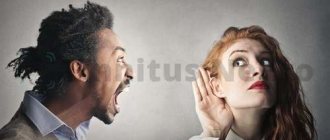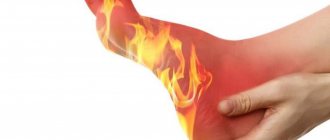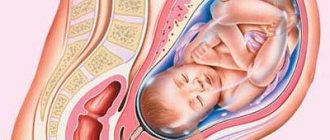Possible causes of tinnitus
Extraneous sounds in the ears can have different characteristics and types. The ringing may be booming, whistling, ringing, humming or monotonous. Sounds can be observed constantly or during a certain period of time. By type, tinnus is divided into subjective and objective. In the first case, the symptom causes discomfort only to the patient. In the second case, the sounds are also audible to surrounding people. It is worth noting that this occurs very rarely, according to statistics, in approximately 0.1% of cases. Why is there a ringing in the ear, let's look at the main reasons:
This is important: It is recommended to consult a doctor as soon as possible and find out the cause of ringing in the ears. Doctors say that over time, this symptom can affect the patient’s psyche.
- Vascular pathology. It occupies a leading position in the causes of this symptom. Often, extraneous ringing in the ears occurs due to compression of blood vessels. This often happens with problems with the spine. As accompanying symptoms, the patient may experience severe dizziness and darkening of the eyes when changing position;
- External stimulus. This group includes the harsh sound factor. For example, an explosion, a sharp bang, or another loud sound. To get rid of an unpleasant symptom, rest in peace for some time. It is worth noting that this reason cannot affect persistent ringing in the ears;
- Otosclerosis. Also refers to common causes of strange sounds in the ears. This pathological condition is characterized by ringing in the ears and significant hearing loss.
- Otitis of various etiologies. As the inflammatory process develops, the patient may feel a ticking ringing in the ears. To prevent the symptom, it is enough to cure the underlying disease - inflammation in the ear;
- Uncontrolled use of medications. In some medications, a symptom such as ringing in the ears is described in the side effects column. If you do not follow the dosage or take pills without a doctor’s prescription, there is a high risk of developing a side effect. To get rid of this factor, it is enough to give up the medicine and drink as much water as possible so that the active substance leaves the body naturally as quickly as possible;
- Presence of a foreign body. sometimes when a foreign body enters the ear canals, the patient feels discomfort in the form of ringing in the ears;
- Development of sensorineural hearing loss. The pathology is typical for older people. First, the symptom of extraneous ringing in the ears occurs. If measures are not taken in time, the symptom develops into hearing loss;
- Presence of neuroma. Neuroma is a benign tumor. To date, the reasons for its occurrence are unknown. As the tumor grows, it affects the nerve endings located in the ear canal. For this reason, an alarming sign arises - ringing in the ears.
Why is my left ear ringing?
Additionally, hum can be divided into objective and subjective. Subjective is considered to be the one in which only the patient hears it, and objective is the one that is heard by the doctor, but this can be found very rarely.
Noise can additionally be classified into vibrational, that is, reproduced by the ear itself and its structural and vascular neoplasms, and non-vibrational, that is, caused by irritation of the nerve ending or inflammation of the cavity of the middle and inner ear.
To confirm the presence of such a pathology, it is necessary to determine the reason why it occurs. To do this, a number of procedures are carried out, in particular auscultation of the skull using a phonendoscope. If the noise in the ear area resembles a pulsation, then this indicates that the cause of the formation is the blood vessels.
This occurs when:
- Aneurysm.
- Malignant formations.
- Other diseases that require surgical intervention.
If the hum resembles a clicking sound, then treatment with anti-inflammatory drugs is required. This type of noise is considered subjective, and only the patient hears it. After determining the type and type of ringing and noise, the specialist will prescribe therapy to eliminate the pathology.
If the ringing is observed in only one ear
A symptom that is observed in only one ear often indicates pathological processes in the ear system. To diagnose the disease, you need to contact an otolaryngologist. In this case, tinnus occurs when inflammation develops in the ear, and sound is observed in only one ear. More often, the reason lies in the entry of pathogenic bacteria into the inside of the ear. As therapy, the doctor suggests antibacterial drugs and local anti-inflammatory drops. As a rule, upon recovery, tinnitus goes away on its own without additional therapy.
Methods for treating tinnitus
Treatment of tinnitus is carried out only in the context of treatment of the disease causing it. For these purposes, a variety of means, physiotherapy and medications can be used. Thus, let us present a number of medications that can be used in the context of combating tinnitus and head noise:
- anticonvulsants that are used for muscle contractions of the middle ear (Difenin, Finlepsin, Konvulex);
- psychostimulants (Cortexin, Fezim);
- drugs that normalize blood circulation (Vinpocetine, Betagistine, Telektol);
- antiglypoxants (Rimecor, Angiosil);
- psychotropic medications, selected individually after consultation with a neuropsychiatrist; antihistamine products (Diprazine, Atarax), etc.
Diagnosis of possible pathologies
To detect the specific cause of the pathology, you must soon go to a therapist, who will definitely prescribe general blood and urine tests. If there are any deviations, the doctor sends you to a specialized specialist. Since discomfort manifests itself in the ears, first you need to visit an otolaryngologist. If there are pathological processes, the doctor will carefully examine the patient’s ear using an otoscope and prescribe the correct, most effective treatment. If the otolaryngologist in his field does not notice any violations, the patient is referred to another specialized specialist - a neurologist. The specialist first collects an anamnesis. He is interested in when exactly the problems began, when the ringing in the ear was first heard, whether there are accompanying symptoms and whether treatment was carried out at home. Next, the patient needs to undergo a computed tomography or magnetic resonance imaging. During these procedures, the condition of the blood vessels is examined and the possible cause of ringing in the ears is determined. Based on the diagnosis, the doctor prescribes the necessary treatment.
The main causes of noise in the left ear and treatment
It is strictly forbidden to consume medications on your own that can eliminate dizziness, pain, and noise. Treatment, therefore, can provoke a deterioration of the condition and the occurrence of serious consequences. Treatment should be prescribed only by a doctor after the diagnosis has been confirmed, and more than once to eliminate inaccuracy and oversight.
As for drug therapy, it should include drugs from the group:
- Anticonvulsants;
- Antihistamines;
- Vasoconstrictors;
- Psychotropic.
If we consider the treatment in more detail, then to remove tinnitus, you initially need to use psychostimulant drugs, such as Phezam, Omaron, Cortexin. Among anticonvulsants, the use of Tegretol, Diphenin, Depakine, Konvulex is noted. The most suitable antihypoxic drugs include the consumption of Preductal, Angiosil, Deprenorm and Rimekor.
The prescription of such drugs is possible only if there is a suspicion of an allergy, which is a side effect of previously taken medications.
The best methods of treatment are the consumption of Atarax, Pipolphen, Diprazine. To improve blood circulation, you can use Betagistine, Vinpocetine and Telektol. If a person has a predisposition to mental disorders, schizophrenia, as well as depression, stress and apathy, then the doctor can prescribe psychotropic drugs, but the prescription should be carried out not by a therapist, but by a neurologist and preferably after consultation with a psychotherapist. In some cases, it is possible to consume tranquilizers and antidepressants that improve sleep, eliminate insomnia, and help relax. However, consumption is carried out under the supervision of a specialist and according to his prescription, since tranquilizers are addictive and may contain narcotic substances.
What to do if you have ringing in the ears
To effectively cure the problem, it is very important to see an experienced doctor who will prescribe all the necessary types of diagnostic procedures. If an extraneous sound occurs suddenly and such a symptom has not been observed before, try measuring your blood pressure level. In some cases, due to high blood pressure, the patient experiences extraneous ringing in the ears. If this factor is the cause, you should contact a neurologist. When prescribing drugs that maintain an optimal level of blood pressure, the alarming symptom disappears.
Regardless of the cause of the symptom and the age of the patient, it is necessary to monitor the level of cholesterol in the blood. High cholesterol provokes a huge number of pathological processes, which are characterized by the appearance of ringing in the ears. To maintain an optimal level of cholesterol in the blood, it is enough to eat properly, namely, give up smoked and fatty foods and give preference to cereal porridges, fresh vegetables and fruits.
If the sounds in the ears bother you due to an inflammatory process in the ear, the doctor should prescribe adequate medications that will help get rid of the problem. Usually we are talking about non-steroidal anti-inflammatory drugs in combination with antibiotics and local anesthetic drops.
When blood vessels are compressed, it is recommended to lead the most correct lifestyle, engage in light sports, give up smoking and alcohol, and maintain proper nutrition. If there are problems with the spine, therapeutic massage may be prescribed.
If the cause is a disturbance in the functioning of blood vessels, medications are also needed to help improve the penetration of blood and oxygen to the patient’s brain. For this purpose, drugs such as Vinpocetine or Actovegin have proven themselves to be excellent. Depending on the complexity of the disease, all drugs can be prescribed in the form of tablets or as injections.
This is important: Do not delay your visit to an experienced specialist. The appearance of a buzzing sound in the ears may be the first signal of the development of a more serious disease.
Causes of noise in the head
Cracking in one or both ears and head can appear at completely different ages. As a rule, noise and pain in the head area under the age of 35 arise due to osteochondrosis in the spine, since the vertebral arteries are compressed and, accordingly, the brain receives insufficient nutrition. Due to changes in blood pressure, the sensations may resemble those of hypotension or hypertension.
Noise occurs due to:
- Vitamin deficiency;
- Anarexia;
- Anemia;
- Disorders of the body's metabolic processes;
- Vascular pathologies, in particular with aneurysm, atherosclerosis;
- Nervous disease;
- Mental disorders.
Noise in the head area in people over 35 years of age occurs due to pathologies that form over time in the hearing aid, which can cause decreased hearing, chronic inflammatory diseases, and tumors in the auditory nerve.
The noise occurs due to the presence of problems such as diabetes mellitus, pathologies in the development of the thyroid gland, disorders of the kidneys, stroke, which provokes a violation of the blood supply to the brain.
If noise occurs in the head in a specific situation, for example, at a time of stress or when getting out of bed, then this is the cause of the pathology. To be more precise, at these moments there is a strong outflow of blood fluid from the head, and also that vascular tone periodically forms, which requires the help of a specialist in the form of treatment, which is selected individually.
Folk remedies against ringing in the ears
It is recommended to take folk remedies for ringing in the ears only in case of vascular pathologies, otherwise such measures will become absolutely useless. It is worth noting that this type of therapy is carried out only with the approval of the doctor. If the doctor himself has not prescribed traditional medicine, the patient can independently inquire how effective these procedures are and whether they can be carried out in the presence of a certain diagnosis. Let's look at a few recipes:
- In folk medicine, recipes based on dried dill are widespread. If the patient has a ringing in the right ear or in the left, this remedy is highly effective and in most cases helps to stop the alarming symptom. Based on the reviews, you can understand that such a remedy can really get rid of the problem. You need to take a small handful of dried dill seeds, it is better to take them from umbrella dill. Place the granules in a glass and pour boiling water over it. The waiting time is about three hours, after which the drink can be taken. Consume orally, at least three times a day, half a glass;
- A drink made from medicinal herbs perfectly tones, saturates the body with various benefits and improves the condition of blood vessels. It is recommended to mix a mixture of dry herbs: juniper, burnet and St. John's wort. Herbs must be taken in equal proportions. Dried herbs are poured with boiling water and infused for 24 hours. You need to drink a third of a glass on an empty stomach before your first meal;
- If you have a ringing in your left or right ear, you can use a pomegranate-based infusion. To prepare the next recipe we need lemon zest and pomegranate. We need to peel the pomegranate; for this recipe we only need the skins. They need to be cut into several parts and left in a dry place for a couple of days. Next, when the crusts become dry, they need to be brought to a powder state in any convenient way. Place the powder (3 tablespoons) in a liter jar, add a chopped handful of lemon zest and pour boiling water over it. Let it brew for about a day, then strain the infusion and drink half a glass daily.
How to remove noise using folk remedies
Traditional medicine regarding acoustic phenomena in the ears has a number of therapeutic and prophylactic means that allow you to get rid of the unpleasant sensation. However, it should be noted that folk remedies are a good auxiliary tool that can only be used in combination with classical treatment. In this case, we can highlight the most pleasant and safe methods of dealing with tinnitus at home:
- lemon balm tea - to prepare the drink, you need to pour 4 tablespoons of the leaves of the plant with a liter of boiling water, leave for an hour and drink every day for several weeks;
- compress with ammonia - to create a remedy, you will need to pour a tablespoon of ammonia into a glass of water, then soak a bandage or gauze in the liquid and apply it to your forehead for forty minutes. The procedure can be carried out every day for 5 days;
- turunda with viburnum - you need to mash a small amount of viburnum berries with honey, then wrap the mixture in gauze, build a turunda to insert into the ear and put the product in overnight.
Preventive measures
Preventive measures include tips and recommendations that will help prevent the development of inflammation inside the ear and the development of the pathological process of blood vessels. Let's take a closer look:
- Eat right. The diet should be based on vegetables, fruits, cereals and meat. You should not eat foods with questionable ingredients;
- Beware of hypothermia and dress appropriately for the weather;
- After water procedures, do not go outside;
- Take any medications only as prescribed by a doctor;
- At the first alarming symptoms, go to the hospital.
Causes and possible diseases
Ringing in the left ear is a symptom of a number of diseases
More than 50% of people have experienced the phenomenon of noise and ringing in the ear at least once. The scientific name for this phenomenon is tinnitus. The sensation of extraneous noise in the ear brings a lot of inconvenience, so the patient tries to get rid of this symptom as quickly as possible.
Ringing in the left ear, the causes of which may be associated both with diseases of the ear itself and with the functioning of blood vessels, is more common. Patients often describe it as noise, squeaking, or humming.
It is impossible to independently identify the cause of ringing in the ear. Only an otolaryngologist can make a diagnosis after an examination.
The causes of noise or ringing in the ear may be the following:
- Otitis. Inflammation of the middle or inner ear is accompanied by many symptoms. Often, in addition to noise, there is a shooting sensation in the ear, redness of the ear canal, pain and burning, and sometimes purulent discharge. But as a rule, pus comes out after treatment, and before that it accumulates, causing pain.
- Hypertension. With high blood pressure, the load on the walls of blood vessels and arteries increases significantly. The result is unpleasant tinnitus. A person literally hears the movement of blood through the vessels. The noise is periodic and coincides with the pulse.
- Sulfur plug. If a large amount of sulfur has accumulated in the area of the eardrum, a feeling of ringing and stuffiness may occur. When the plug becomes dense and large enough to put pressure on the eardrum, severe headaches and a reflex cough may appear.
- Atherosclerosis. Blockage of arteries and blood vessels with cholesterol plaques sometimes leads to noise in the ear, which is associated with disruption of their function. Most often, the occurrence of unpleasant tinnitus is a harbinger of atherosclerosis, that is, timely treatment will help stop the development of a dangerous disease.
Also, tinnitus often occurs during severe stress or physical exertion, after prolonged exposure to loud sounds, for example, after a concert or visiting a club. In a young child, noise in the ear may be caused by a foreign object. It is not recommended to remove it yourself, as it can damage the eardrum.
Dangerous symptoms and consequences
We look for the root cause of ringing in the ear from an otolaryngologist
Complications and consequences largely depend on the cause of tinnitus. Many severe ear diseases lead to temporary or permanent hearing loss. Even ordinary wax can lead to decreased hearing function.
A disease such as otitis media, in its advanced form, can lead to meningitis (inflammation of brain tissue). In young children, the likelihood of meningitis is higher, since their otitis media is often more severe and the distance between the membranes of the middle ear and the brain is smaller. Also, otitis media can become chronic or chronic sinusitis.
Inflammation can move from one area of the ear to another, spreading further. In rare cases, there is a malignant tumor that can cause noise and ringing in the ear. If the cause is oncology, there is a possibility of death.
If alarming symptoms appear, you should see a doctor as soon as possible.
Dangerous signs include:
- Loud whistle. If the noise in the ear has turned into a loud whistle that can only be heard by the patient, you need to seek medical help. It may be a symptom of cerebrovascular disease.
- Severe pain. Ringing in the ear, which is accompanied by sharpness and pain both in the ear canal and in the temples and back of the head, requires immediate examination. Such symptoms may be signs of severe otitis media.
- Nausea and vomiting. If severe nausea, gag reflex, or persistent vomiting occurs, medical attention is necessary. Nausea may be a sign of earwax pressing on the eardrum, or incipient meningitis.
- Sudden hearing loss. If hearing function has noticeably decreased, you need to immediately undergo examinations and identify its causes.
- Blood and pus from the ear canal. The appearance of purulent or bloody discharge from the ear indicates a severe inflammatory process that cannot be ignored. Often such discharge is accompanied by severe pain. You cannot eliminate the symptoms yourself with drops or boric alcohol. A doctor must prescribe medications.
The sooner the patient consults a doctor, the more effective the prescribed treatment will be. At the stage of complications, it is more difficult to cure the disease. Some consequences may be irreversible.
Diagnostics
To eliminate congestion in the right ear and noise, you need to identify the causes that lead to discomfort. This is revealed using:
- otoscopy;
- audiometry;
- vestibulometry;
- Valsava samples;
- angiography;
- Dopplerography;
- Ultrasound of cerebral vessels;
- X-ray of the cervical spine;
- CT and MRI.
It is imperative to perform a laboratory blood test to detect inflammation or infection. Antibacterial sensitivity testing is also required. A comprehensive examination consists of consulting an otolaryngologist, therapist, ophthalmologist, cardiologist, neurologist, neurosurgeon.
How physiological is the sensation of tinnitus?
The causes of constant or periodic ringing in the ears can be pathological. So and physiological. Often people of different ages experience some ringing in the ears in complete silence; such ringing is normal and arises as a result of the functioning of the neurosensory system of the inner ear and cochlear organ. Physiological noise occurs in more than 90% of people, regardless of gender and age. Difficulties in assessing the intensity of physiological noise lie in the subjectivity of the assessment by each individual person. Usually a person adapts to such noise and does not pay attention to it at all, however, with the development of any pathological condition on the part of the neurosensory part of the hearing aid or any other, as well as with some vascular diseases, the intensity of tinnitus can increase significantly, which leads to to the formation of tinnitus symptoms.
How to help yourself?
Diagnosing this disease is complicated, so self-medication is not allowed. You can greatly harm your health. If the disease manifests itself in the form of hearing impairment, it is important to follow the doctor’s advice. Typically, experts recommend adhering to the following rules:
- It is important to monitor your blood pressure and measure it regularly.
- You should not visit places with strong noise.
- Consume less salt to prevent this condition.
- Healthy hearing requires relaxation and relaxation.
- Do not smoke, drink coffee, tea, or Coca-Cola. These products lead to tinnitus.
- Sports and a healthy lifestyle are excellent prevention.
- A hearing aid helps with hearing loss. If your doctor has prescribed its use, do not disregard the recommendation.
- You can use tinnitus maskers. These are devices similar to hearing aids, but they mask noise.
- Tinnitus maskers with hearing aid function enhance the therapeutic effect.
Practical advice
If you experience ringing in the ears, and even more so it bothers you and interferes with your activities, you should not delay in contacting a specialist for professional help, otherwise you may miss the progression of a serious disease that may be accompanied by ringing in the ears. Only a specialist - an otorhinolaryngologist will be able to accurately determine the cause of tinnitus and plan subsequent treatment. By the way. Following the advice of your doctor is a prerequisite for effective relief from an unpleasant symptom. Take care of your body and health, be happy!
Clinical Brain Institute
Rating: 4/5 – 111 votes










